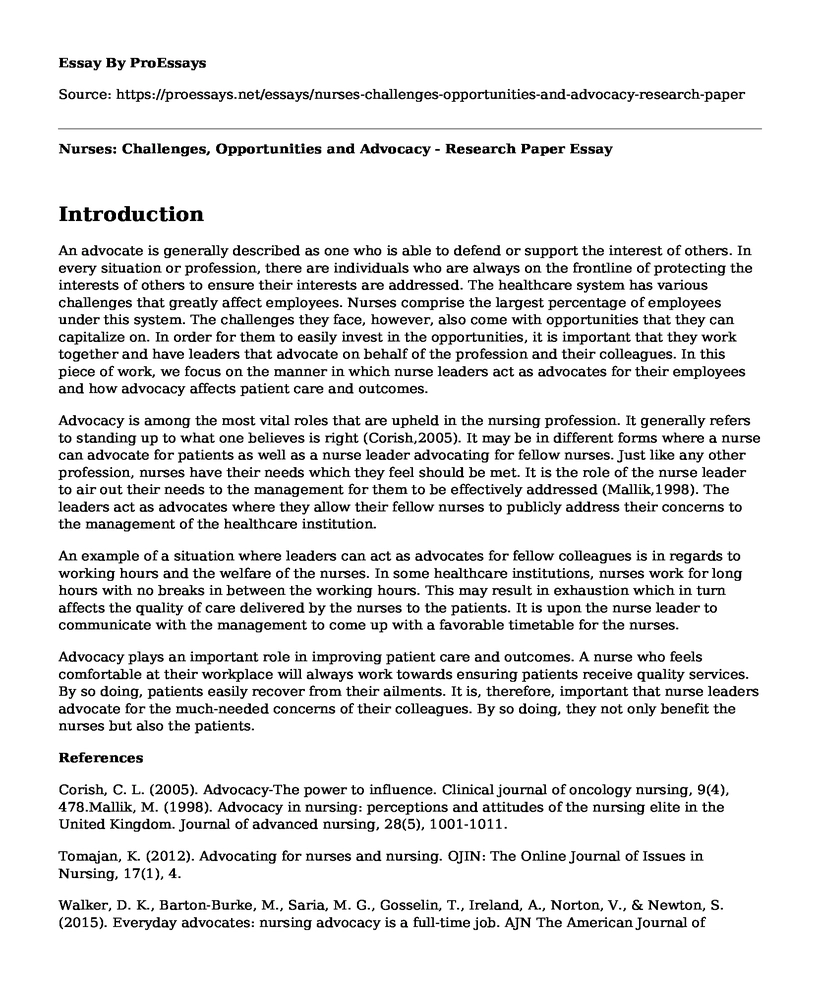Introduction
An advocate is generally described as one who is able to defend or support the interest of others. In every situation or profession, there are individuals who are always on the frontline of protecting the interests of others to ensure their interests are addressed. The healthcare system has various challenges that greatly affect employees. Nurses comprise the largest percentage of employees under this system. The challenges they face, however, also come with opportunities that they can capitalize on. In order for them to easily invest in the opportunities, it is important that they work together and have leaders that advocate on behalf of the profession and their colleagues. In this piece of work, we focus on the manner in which nurse leaders act as advocates for their employees and how advocacy affects patient care and outcomes.
Advocacy is among the most vital roles that are upheld in the nursing profession. It generally refers to standing up to what one believes is right (Corish,2005). It may be in different forms where a nurse can advocate for patients as well as a nurse leader advocating for fellow nurses. Just like any other profession, nurses have their needs which they feel should be met. It is the role of the nurse leader to air out their needs to the management for them to be effectively addressed (Mallik,1998). The leaders act as advocates where they allow their fellow nurses to publicly address their concerns to the management of the healthcare institution.
An example of a situation where leaders can act as advocates for fellow colleagues is in regards to working hours and the welfare of the nurses. In some healthcare institutions, nurses work for long hours with no breaks in between the working hours. This may result in exhaustion which in turn affects the quality of care delivered by the nurses to the patients. It is upon the nurse leader to communicate with the management to come up with a favorable timetable for the nurses.
Advocacy plays an important role in improving patient care and outcomes. A nurse who feels comfortable at their workplace will always work towards ensuring patients receive quality services. By so doing, patients easily recover from their ailments. It is, therefore, important that nurse leaders advocate for the much-needed concerns of their colleagues. By so doing, they not only benefit the nurses but also the patients.
References
Corish, C. L. (2005). Advocacy-The power to influence. Clinical journal of oncology nursing, 9(4), 478.Mallik, M. (1998). Advocacy in nursing: perceptions and attitudes of the nursing elite in the United Kingdom. Journal of advanced nursing, 28(5), 1001-1011.
Tomajan, K. (2012). Advocating for nurses and nursing. OJIN: The Online Journal of Issues in Nursing, 17(1), 4.
Walker, D. K., Barton-Burke, M., Saria, M. G., Gosselin, T., Ireland, A., Norton, V., & Newton, S. (2015). Everyday advocates: nursing advocacy is a full-time job. AJN The American Journal of Nursing, 115(8), 66-70.
Cite this page
Nurses: Challenges, Opportunities and Advocacy - Research Paper. (2023, Mar 16). Retrieved from https://proessays.net/essays/nurses-challenges-opportunities-and-advocacy-research-paper
If you are the original author of this essay and no longer wish to have it published on the ProEssays website, please click below to request its removal:
- Essay Example on Long-term Healthcare
- Assignments on Epidemiology and Healthcare Reflection Professions
- The Nature and Background of the Emergency Response - Article Analysis Essay
- Critical Differences Between DPN and PhD or DNS Programs Paper Example
- My Thoughts on Vaccines: Research Paper Example
- Essay Example on Sustainable Medical Waste Management: Cost and Benefits
- Annotated Bibliography on Animal Products: A Health Hazard in Today's Society







